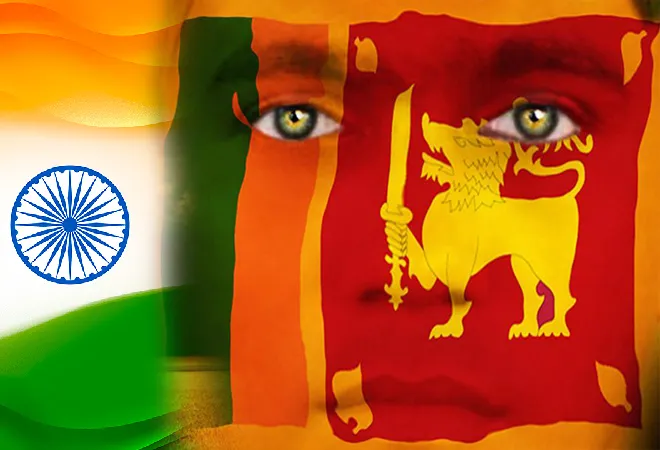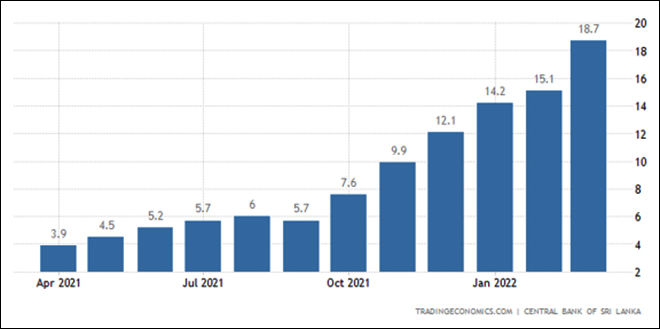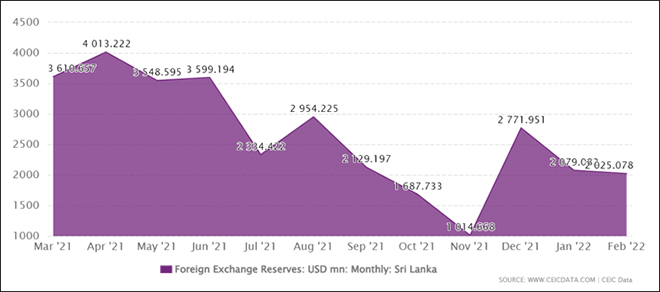
While the
Central Bank of Sri Lanka’s 7 percent increase in repo and reverse repo rates may appear spectacular when compared to the 25 to50 basis point changes one may be accustomed to ordinarily, even this may prove too little, too late to curb the
galloping inflation that the island nation is witnessing (see Figure 1). Compounding worries include the acute
fuel shortage, the costs of which would be mostly borne by the fishing community.
Figure 1:
Sri Lanka Inflation Rate - March 2022 Data - 1986-2021 Historical - April Forecast (tradingeconomics.com).

From a purely textbook standpoint, the current economic distress is because of the depletion of foreign exchange reserves (see Figure 2) due to a
balance of payments crisis. A closer inspection must, however, determine the causes and circumstances which have led Sri Lanka’s economy to the proverbial brink. While broad-brushed critiques based on
economic mismanagement by successive regimes are often alluded to, specific reasons for the severe downturn in the country’s fortunes lie at the intersection of
external debt-driven populism, the ongoing COVID-19 pandemic, and the
political ham-fistedness of the Rajapaksa clan.
Figure 2:
Sri Lanka Foreign Exchange Reserves, 1956 – 2022 | CEIC Data.

According to the country’s Finance Minister Ali Sabry, Sri Lanka requires US
$3 billion in foreign assistance within half a year to restart essential supplies like food and medicines. For perspective,
analysts at J.P. Morgan estimate Sri Lanka’s gross debt servicing at US $7 billion this year, with current account deficit at US $3 billion. And it is indeed ironical that as India attempts to bail Sri Lanka out from its economic quagmire, the Lankan government is requesting for a further US
$1 billion in aid from China, the same country whose
debt-trap diplomacy Sri Lanka finds itself a victim of.
China has thus far expressed no interest whatsoever in assisting Sri Lanka escape its predicament. Not only has
China declined any compromise in debt repayment or restructuring, its state-run media has mocked the country by blaming Sri Lanka’s
dollar dependence and pro-India policies for the dire situation. As per Zhang Xiaoyu, a research fellow at Communication University of China, the Sri Lankan government has failed to grasp the opportunity to “restructure Sri Lanka’s economy and put forward large-scale reforms.
Growth has been driven by construction and domestic retail, neither of which can be traded on the global market”.
India, in contrast, has been
generous and brotherly in its attitude toward its southern maritime neighbour. There is ample rationale for New Delhi to attach terms involving “unfriendly third parties” to any provision of credit, aid, or assistance in terms of
prying Sri Lanka loose from China’s embrace, and yet New Delhi has displayed unfettered commitment toward unconditionally supporting the Lankan people in their hour of need.
India’s External Affairs Minister S. Jaishankar, for instance, committed to
exporting food without undue advantage. Despite there being
bureaucratic difficulties in implementation, the Indian High Commissioner to the nation, Gopal Baglay, stated that
India has already provided assistance amounting to US $2.5 billion to Sri Lanka with focus on currency—currency swap and credit for food, fuel, and energy.
As forthcoming as India has been, its humanitarian assistance shall not suffice to extricate Sri Lanka from its current crisis. Therefore, there is merit in the latter’s
outreach to the International Monetary Fund (IMF). It is encouraging that the IMF is closely
monitoring political and economic developments in Sri Lanka.
While Sri Lanka’s crisis is certainly not of India’s making, the country is India’s neighbour and there should be no space thereof for hesitation in doing what is possible to assist in the country’s recovery. Yet, Chinese propaganda attempting to tarnish India’s image both globally and before the Sri Lankan masses needs to be proactively guarded against, and India’s humanitarian efforts must be publicised both in Sri Lanka and internationally. Therefore, instead of the age-old “
neki kar, dariya mein daal” (do good and forget about it), India’s mantra should be “
neki kar, danka baja” (do good and publicise it).
The views expressed above belong to the author(s). ORF research and analyses now available on Telegram! Click here to access our curated content — blogs, longforms and interviews.



 While the
While the 

 PREV
PREV


